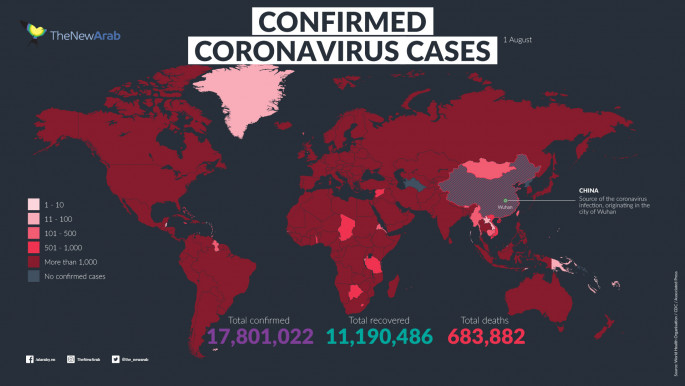The Middle East at war with coronavirus: Top stories from 23 June
1. Saudi Arabia to slash Hajj pilgrim numbers from 2.5 million to 1,000
The pilgrimage was performed by 2.5 million people last year, and is considered the world’s largest human gathering.
The pilgrimage, scheduled for the end of July, will be limited to those below 65 years of age and with no chronic illnesses, Health Minister Tawfiq al-Rabiah said.
The pilgrims will be tested for coronavirus before arriving in the holy city of Mecca and will be required to quarantine at home after the ritual, Rabiah added.
2. Iran reports highest daily coronavirus death toll since April
Health ministry spokeswoman Sima Sadat Lari told a news conference that the new fatalities brought the overall virus death toll to 9,863.
That is Iran's highest single-day fatality rate since 11 April, when 125 deaths were recorded.
Lari also announced another 2,445 people had tested positive for Covid in the past 24 hours, raising the country's caseload to 209,970.
The Islamic republic recorded a drop in its daily fatalities in early May, but there has been a rise in recent weeks.
There has been scepticism at home and abroad about the country's official Covid-19 figures, with concerns the actual toll could be much higher.
Iran has not imposed a mandatory lockdown on people to stop the virus's spread, but it closed schools, cancelled public events and banned movement between the country's 31 provinces in March.
Read more here

3. Jordan rolls out electronic bracelets trial
The trial period, which started on Monday, will be used for a limited number of people, Director of the Coronavirus Crisis Management Cell, Brigadier General Mazen Al-Farraya said.
Authorities are still working on the technicalities of the bracelet and it will not yet be imposed as an official measure for all Jordan citizens.
"The use of electronic bracelets is new and rolling it out to the general public will require a successful first experiment," media spokesman for the National Committee for Epidemiology, Nazir Obaidat told Al-Araby Al-Jadeed.
The aim of the bracelet is to ensure that the public commits to official coronavirus quarantine measures, including social distancing, the official continued.
He warned that despite Jordan managing the health crisis so far, there is the potential for a second wave of Covid-19 in the kingdom.
Read more here
 |
|
Egypt is gradually loosening its partial coronavirus lockdown amid a steady increase of daily infections in recent weeks.
Prime Minister Mustafa Madbouly said Tuesday that his government would reopen mosques and churches starting Saturday and the ban on Friday’s Muslim prayers at mosques and Sunday’s masses at churches would remain in place for now.
He says restaurants, coffee shops, clubs and theaters will allowed to reopen at 25% capacity. The government has also extended the hours public and private transposition can operate by four hours, until midnight. It also lifted the country's night-time curfew.
Madbouly says Egypt's beaches and parks remain closed until further notice.
The gradual reopening was announced as the the daily number of new coronavirus cases in Egypt has often surpassed 1,000 in recent weeks.
The Arab world’s most populous country has officially reported around 57,000 confirmed cases, including at least 2,278 deaths.
5. Life of Canadian detained in Egypt without charge 'hanging by a thread'
Twitter Post
|
Yasser Ahmed Albaz, 52, has been held in Cairo's feared Tora prison since February last year, when he was detained at the airport on his way home. He has not been charged with any crime.
Albaz is currently fighting pneumonia, which his family suspect is a symptom of a serious Covid-19 infection as the novel coronavirus reportedly runs rampant in the cramped and unsanitary conditions of the Egypt's notorious detention facilities.
Appeals for the Canadian government to assist in his transfer from the prison to a private hospital have gone unanswered, his daughter told local media.
"I haven't heard back from the government and haven't received acknowledgment and it's very concerning because the urgency has escalated," Amal Ahmed Albaz told CTV News Toronto on Monday. "I have been saying his life is on the line, but now it's hanging by a thread."
Her father, who displays "all the Covid-19 symptoms", has several risk factors for the potentially deadly illness, including high blood pressure.Canadian doctors who the family spoke with about Albaz's condition said he could die if he did not receive proper medical treatment, she said.
"We need the government to everything they can to get him to a private a hospital. A Canadian is dying in an Egyptian prison and our Canadian government needs to get him to a hospital," Amal said.





 Follow the Middle East's top stories in English at The New Arab on Google News
Follow the Middle East's top stories in English at The New Arab on Google News


